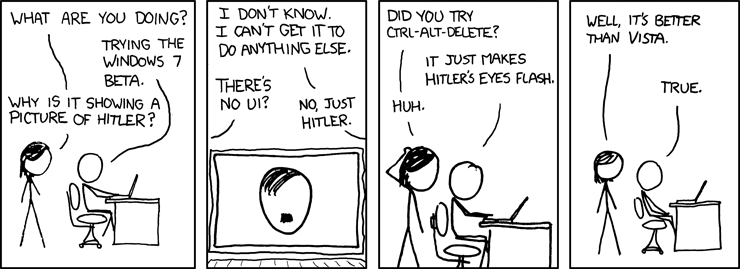Reflections on Windows 7
While I have not had the opportunity to try the latest Windows 7 Release Candidate, I have done a bit of reading on the subject. In my research, I have made the following observances 1
Vista was truly the worst operating system I have ever used in my life. 2 It had some wonderful features, but everything was tied together so inefficiently It could bring the fastest computer around to its knees. I have used Vista on a rather powerful quad core system with over 4 GB of RAM, and it still responded poorly. There were a few things in Vista that were wonderful ideas, but executed horribly:
- Integrated Search and Indexing
- ReadyBoost for superior caching
- Windows XP Compatibility Mode
- Application Pre-Caching based on Observed User Activity
- Bending over backwards for old API compatibility 3
Windows 7 looks promising, however. Take a look at the list of new improvements:
- Transparent Windows XP Virtualization Compatibility Layer
- Responsiveness existent 4
- Advanced Window Management Abilities
- New Version of ReadyBoost
- Integrated ClearType Tuning (about time)
- Feature-Packed Application Bar
Windows 7 is what Vista was supposed to be from what I understand. 5 I'm keeping my fingers crossed, but I do look forward to this new Operating System. I sincerely hope that it truly is a great improvement. We'll see.
Writing about Windows 7 before its official release in 2009 shows the anticipation and careful analysis typical of tech enthusiasts during major OS transitions. The reliance on research rather than hands-on experience reflects the limited access to pre-release versions.↩
This harsh assessment of Vista was widely shared in the tech community. Vista's poor performance, driver compatibility issues, and invasive User Account Control made it deeply unpopular, leading many users to stick with Windows XP or switch to alternatives.↩
This list captures Vista's core technical innovations that were conceptually sound but poorly implemented. Features like integrated search, ReadyBoost caching, and application pre-loading were ahead of their time but suffered from performance overhead and system resource conflicts.↩
The phrase "Responsiveness existent" humorously highlights how Vista's poor performance made basic system responsiveness a noteworthy feature for Windows 7. This reflects the low expectations Microsoft had to overcome after Vista's failure.↩
This common perception that "Windows 7 is what Vista was supposed to be" proved largely accurate. Windows 7 successfully implemented Vista's vision with better performance, refined UI, and improved compatibility - essentially Vista's features without its problems.
